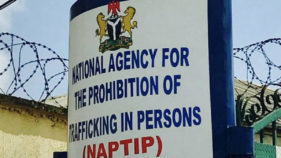National Agency for the Prohibition of Trafficking in Person, (NAPTIP), has commended the Nigeria judiciary over what it described as ‘recent landmark convictions’ on Sexual and Gender Base Violence, (SGBV), and related offences under the Violence Against Persons Prohibition, (VAPP), Act.
Director General, NAPTIP, Professor Fatima Waziri-Azi, gave the commendation weekend in Abuja at a One-Day Retreat with Judges and Prosecutors on Strengthening Government Approach in Prosecuting Sexual and Gender-Based Violence, sponsored by the Ford Foundation in partnership with NAPTIP and the National Judicial Institute, (NJI).
Calling for robust partnership between NAPTIP, Judges and prosecutors across every state of the federation, she said “In 2022 we secured four convictions in the FCT and we also secured one landmark rape conviction in Sokoto after we obtained a fiat, (legal authorization) due to incremental cases of rape and violence in the state.
So far, 35 states have their different versions of the VAPP Act and the only state left is Kano. But we are all aware that the current state of affairs must change or all will be lost. We carry out our work based on a five-pronged strategic approach of prosecution, prevention, partnership and policy and in addition to implementing the trafficking in Persons Act, in 2015, with the enactment of the VAPP Act, NAPTIP was given additional responsibility to implement this Act in the FCT.
Waziri-Azi noted that “NAPTIP was established in 2003 as Nigeria’s focal anti-human trafficking law enforcement agency. It’s actually on record that NAPTIP is the first anti-human trafficking law enforcement agency in Africa and a number of African countries actually came to understudy the operations of NAPTIP and went back to establish theirs and the latest is Sierra Leone.
“For the FCT, there is heightened awareness regarding these issues of violence, people are better informed and they know what is acceptable and what is not within the ambit of the law and the general effect of all of this is the increased reportage of cases of violence,” she explains.
“In 2022, we receive 1, 342 reported cases of violence and abuse through our 24-hour call center and others, and from January to June, we have already received 623 reported cases and the highest number of reported cases.
“In 2022, the highest reported cases received were on spousal abuse, fast forward to 2023 in six months, the highest number of reports received is still spousal abuse so that tells us that it is a very big problem within the family,” she said.
According to her, “This retreat is to create a platform for prosecutors and judges to share unique experiences in the trying and prosecution of sexual and gender-based violence. I hope all the prosecuting counsels here will take advantage of this privileged opportunity to listen and learn from my Lords on how to carry on in the courtroom as we are all aware of the enormity of the challenge we face as a people and as a country when it has to do with issues of domestic and sexual violence such as domestic violence, emotional abuse, harmful cultural practices, rape, incest and the likes of it.
Speaking on the central role of the judiciary in speedy dispensation of justice through collaboration with NAPTIP, honourable Justice Salisu Garba, (Rtd), said the collaboration is a reflection of the continuous effort of NAPTIP in carrying out its mandate.
He said SGBV victims “suffer a range of issues that severely impacts their lives and may often pay the ultimate price.
“It is therefore commendable that NAPTIP continues to put a lot of effort into curving the instances and effects of SGBV and other related crimes in Nigeria.
He notes that “It is important that prosecution of these cases is done in accordance to the rule of law that ensures the human rights of all parties are respected and proper procedures followed.
“The scourge of SGBV and other related crimes must be caught on all fronts with all relevant parties playing their respective roles with utmost sense of justice and integrity.”
He notes with dismay the rising cases of spousal abuse in the Federal Capital Territory, (FCT), making close to half of 8, 342 reported cases of abuse and other related cases of violence.
In this article

